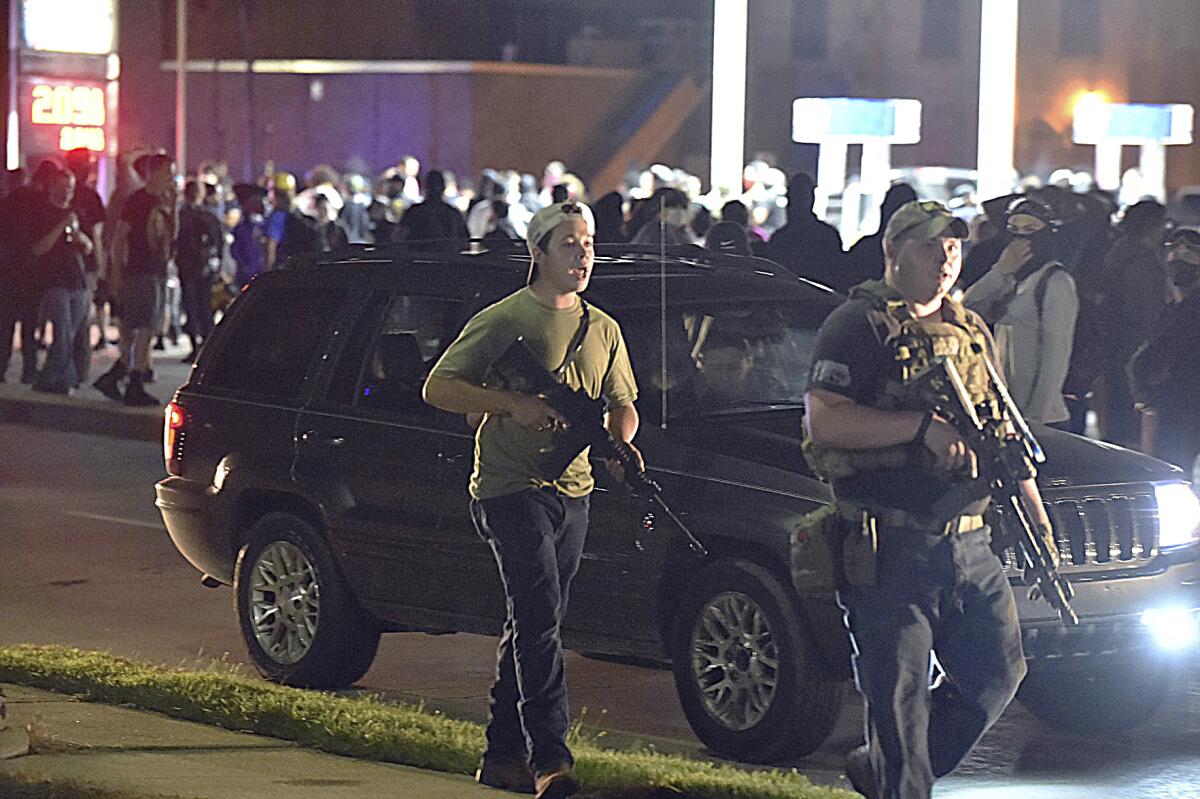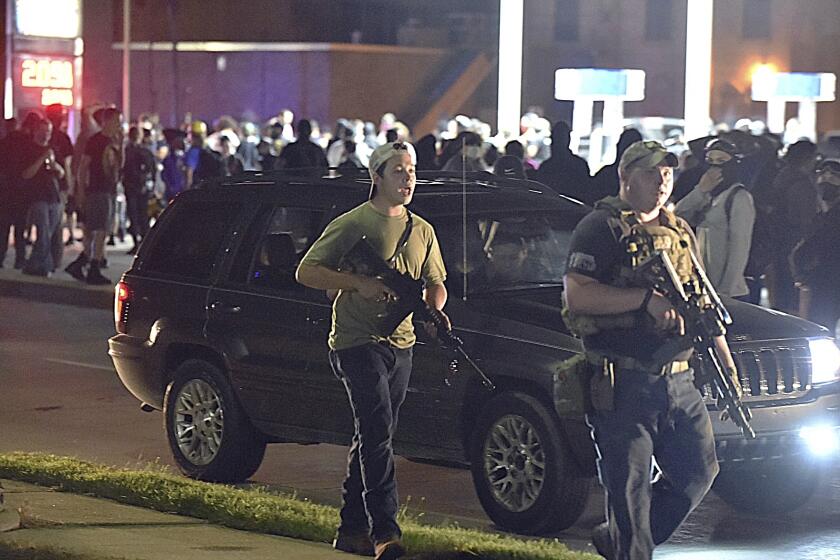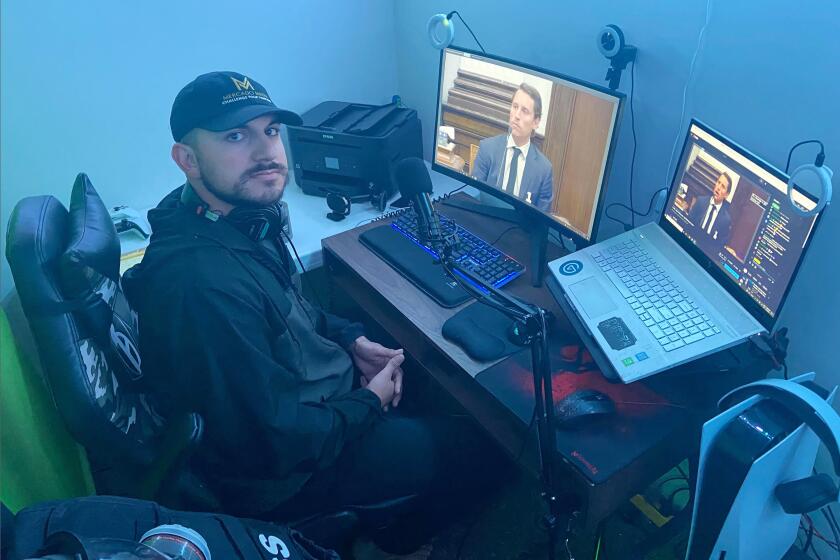Will Rittenhouse acquittal lead to more armed confrontations at protests?

- Share via
HOUSTON — The acquittal of Kyle Rittenhouse on murder charges has raised the specter, legal experts say, that armed vigilantes may descend on social justice protests at a time of deepening bitterness between America’s conservatives and progressives.
“I find this so troubling. We’re at a point where a person with a plastic bag who has an encounter with someone with an AR-15 where we say it’s the person with a plastic bag who is a deadly threat,” said Ion Meyn, an assistant professor of law at the University of Wisconsin-Madison. “How does someone recognize if we have an active shooter or not? What do we do now going forward?”
The rise of Black Lives Matter protests against police brutality in recent years sparked armed counter-protests in gun-friendly states such as Wisconsin, Kentucky, Missouri and Texas. The Rittenhouse case raised questions about self-defense, gun rights and white vigilantes appearing at protests like the one that drew Rittenhouse to Kenosha, Wis., last year, sparked by a white police officer’s shooting of a 30-year-old Black man, Jacob Blake.
An acquittal wouldn’t just set Rittenhouse free, it would set a legal precedent for other citizens to grab a gun and take the law into their own hands.
The question before jurors was whether it was beyond a reasonable doubt that Rittenhouse, then 17, was acting in self-defense when he fatally shot Joseph Rosenbaum, 36, and Anthony Huber, 26, and wounded Gaige Grosskreutz, then 26. Rittenhouse testified that he had traveled to the protests from his home in Illinois to help protect private property and that he fired in self-defense after being threatened.
Defense attorneys successfully argued that Rosenbaum had chased Rittenhouse and tried to grab his rifle, that Huber had struck him with a skateboard and Grosskreutz had pointed a loaded pistol at him.
“There was a gun pointed at me; I was in fear for my life,” Rittenhouse testified.
But Grosskreutz also testified that he feared for his life and was trying to disarm Rittenhouse. Asked what he was thinking at the time, Grosskreutz testified, “that I was going to die.”
Jurors deliberated for about four days before pronouncing Rittenhouse not guilty on all five counts, the most serious being first-degree intentional homicide and first-degree reckless homicide.
People streaming live video have become ubiquitous at protests, seeking to provide an unedited view into the most violent clashes.
Meyn said Rittenhouse’s acquittal is likely to embolden gun rights advocates and could lead to armed confrontations at protests, particularly in “open carry” states like Wisconsin that don’t require gun owners to conceal their weapons. He noted that Rittenhouse’s defense relied on a police use-of-force expert and that the verdict could be interpreted as endorsing vigilante patrols, “extending the privilege we give police officers to civilians who open-carry.”
Three white Georgia men standing trial this week in the fatal shooting of Ahmaud Arbery, a 25-year-old Black man, similarly framed the shooting as self-defense in the interest of public safety, Meyn said, with one insisting on the stand this week that after he pointed his gun at Arbery he didn’t comply.
“What does that have to do with self-defense? That’s aggression. We’ve accepted that when you point a weapon at someone, that’s self-defense,” Meyn said. “They’re expanding the definition of self-defense to include aggression, and that having an AR-15 entitles you to tell someone to submit. This is what you hear in officer-involved shootings.”
Meyn said that the expansion of self-defense in the Rittenhouse case implicitly doesn’t apply to people of color. “It only increases the danger,” he said.
“The benefit of the doubt that we give to white gun owners is that they’re the law-abiding, good people. The narratives with individuals in communities of color is they get stopped and frisked when there’s a bulge in their pants,” he said. “It’s dangerous conditions to be a person of color in society vis-a-vis the police and these white individuals walking around with guns who now are emboldened by the Rittenhouse acquittal.”
The verdict may have been influenced by Judge Bruce Schroeder’s exclusion of a prior incident, 15 days before the fatal shooting, when Rittenhouse saw people running from a CVS pharmacy and said he wished he had his AR-15-style rifle. “I’d start shooting rounds at them,” he reportedly said. Schroeder, 75, who is white, is the state’s longest-serving circuit judge, and has faced criticism during the trial for appearing too chummy with Rittenhouse and his attorneys.
“That was a really powerful piece of evidence that the judge took away from the prosecutor,” said Keith Findley, a professor of criminal law at the University of Wisconsin.
“This verdict doesn’t set a legal precedent in the sense that it makes new law or binds future decisions,” Findley said. “But it does help set a cultural norm. It sends a message to the community that it is OK to show up at protests, at very volatile public events, and take the law into your own hands because the law will cover your back if things go bad.”
Janine Geske, a former Wisconsin Supreme Court justice, agreed and said the verdict would probably lead those already protesting police brutality to broaden their platform to include “a system that allows people, vigilantes they call them, to show up with high-powered rifles and in their view assassinate people.”
“There’s going to be a lot of civic rage,” Geske said.
She was surprised the judge didn’t poll the jury, and that only a day was spent selecting the initial group of 20 jurors, without background questionnaires. One juror, a middle-aged man, was dismissed during the trial for telling a deputy a joke about Blake’s shooting. Of the remaining 12 jurors (five men and seven women), only one appeared to be a person of color.
“They didn’t have enough time for a jury consultant to do a study of those jurors. You wonder what the personal views were of those jurors in terms of gun control, Black Lives Matter,” said Geske, a law professor at Marquette University.
Geske said that in light of the verdict, lawmakers should reassess gun laws and permitting for guns at protests.
“To allow people to open-carry guns at protests is asking for violence in our streets. We’re going to have both groups arming themselves soon, the protesters and the anti-protesters,” she said, and those who survive “can claim self-defense.”
Even though Rittenhouse was acquitted, UC Berkeley Law School Dean Erwin Chemerinsky said, “It’s important to remember that Rittenhouse is ultimately responsible for the deaths of two people.”
Chemerinsky said he worried Rittenhouse would be seen as a hero.
“We are at such a tense time in our society. I wish everyone would condemn what Rittenhouse did even though he was acquitted of a crime,” Chemerinsky said.
Paul Bucher, a Milwaukee-area lawyer and former longtime prosecutor, disagreed about the legal impact of the verdict, saying he thought it would be difficult to claim self-defense in other states under different circumstances.
“If people think this is a self-defense case that will give them protection, they are sadly mistaken,” Bucher predicted, saying Rittenhouse shouldn’t be viewed as either a hero or a vigilante.
Bucher, a Republican gun owner who ran unsuccessfully for state attorney general, said he fears fallout from the verdict in the streets.
“I’m sure there’s people out there who want revenge,” he said. “…This case spiraled out of control very quickly, and it just got worse and the judge fed into it: Republican v. Democrat, white supremacist v. Black Lives Matter. I wouldn’t be going down to Kenosha.”
Bucher, who practices in Kenosha, said that because of the verdict residents “are scared to death and law enforcement are on their tiptoes, hoping and praying something doesn’t happen.”
“But it’s not going to be restricted to Kenosha. I anticipate there will be other protests,” Bucher said. “Everybody has a different definition of justice.”
Times staff writer Maura Dolan in San Francisco contributed to this report.
More to Read
Sign up for Essential California
The most important California stories and recommendations in your inbox every morning.
You may occasionally receive promotional content from the Los Angeles Times.













